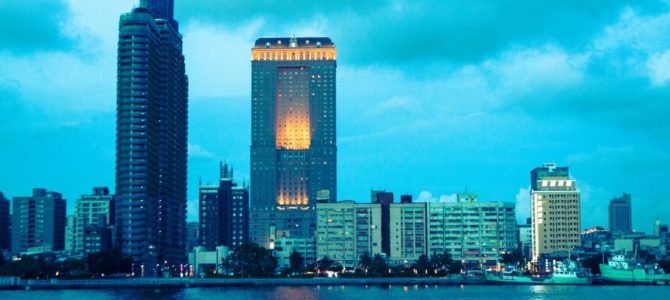
David Frum is a prominent member of the foreign policy priesthood, albeit an accidental one, and he continues to urge U.S. foreign policy errors in a new Atlantic article about China. “China Is a Paper Dragon” argues the Biden administration is unnecessarily concerned about the People’s Republic of China (PRC).
Frum’s argument is part of a larger effort by high-profile pundits to suggest that if China attacks democratically ruled Taiwan, helping Taiwan is not worth the risk of war with China. He’s wrong about this, like he has been wrong about foreign policy for years.
The right approach to the PRC, Frum opined in 2015, should be one of economic engagement with military containment. But what happens when mercantilist China leverages 20 years of Permanent Most Favored Nation status and membership in the World Trade Organization, which Frum frequently urged, to finance a formidable military machine?
By 2015, it was glaringly obvious that China had become a military threat, but Frum stuck to his metaphorical guns, writing, “China’s admission to the World Trade Organization in 2001 was necessary and unavoidable.” Now that Frum’s urged economic engagement with the PRC has made containing it increasingly difficult and dangerous, he wants to throw in the towel. In Frum’s recent Atlantic piece, he virtually invites the Chinese Communist Party to take over democratic and self-ruled Taiwan.
Frum draws his Atlantic arguments from Michael Beckley’s 2018 book, “Unrivaled: Why America Will Remain the World’s Sole Superpower.” Beckley, a Tufts University professor, argues that China, while possessing a large economy, historically and today has had to dedicate a large portion of its resources towards controlling its populace. Further, he claims China’s supposed advantages in weaponry, technology, and research are vastly overstated.
As a result, American policymakers “risk harming this country by justifying protectionism and inflating the defense budget beyond reasonable levels,” Frum argued in a supporting tweet. He continued, “Trump added $100 billion / year in defense spending, most of it aimed at fighting China.”
Frum then suggested the $200 billion annually saved from spending less on defense and on creating more robust supply chains could be used to “buy a *lot* of more authentic usefulness: carbon reduction, road improvement, cheaper college tuition.” In other words, don’t worry about the People’s Republic of China; instead, relax and spend the peace dividend on domestic priorities.
Frum’s Advice Crippled Our Ability to Contain China
Frum joined the new George W. Bush administration as an economic speech writer in January 2001. After 9/11, Frum stayed on another five months, and was credited with minting Bush’s phrase “Axis of Evil” to describe an arrangement of terror-sponsoring nations—Iran, Iraq, and North Korea—in his State of the Union address.
Frum’s involvement with the Bush administration’s formative response to 9/11 led to a decade of him justifying America’s deepening involvement in both Iraq and Afghanistan. Eventually, Frum soured on the war in Afghanistan. But by then U.S. involvement was stuck.
Fighting wars, mending veterans, and building nations cost some $7 trillion over 20 years, about $2 trillion of that in Afghanistan alone. Assume, for a moment, that half of that $2 trillion spent fighting in Afghanistan while propping up its weak and corrupt government could have been saved if the war were wound down 10 years ago.
Perhaps half of that savings might have been invested in better military technologies and procurement. A half-trillion dollars could purchase scores of naval vessels, a larger, more capable Marine Corps, and aircraft and missiles capable of sinking enemy shipping and damaging their ports and airfields.
This investment, had it been made, would alter today’s correlation of forces in the strategic Taiwan Strait—the waters separating the lynchpin of the first island chain from China. But instead, our foreign policy opinion leaders, Frum among them, locked America into no-win conflicts that they neither had the moral courage nor the imagination to wind down. This left us with a defense and foreign policy that treated all threats as existential threats.
But he who defends everything defends nothing. Priorities must be made. The Taliban, operating out of Afghanistan, has no industrial potential, no capacity to forge a modern military capable of projecting force, and no ability to build a nuclear arsenal. The People’s Republic of China has all those things—and likely far more of them than we know.
Frum’s Take on China Is at Least as Bad
In Frum’s Atlantic piece, he paints a sanguine portrait of a post-PRC invasion of Taiwan, suggesting that, “any such attack (would) cost China dear in ships and men – smashing up the Chinese armed forces for a long time to come. But more important: Suppose China did ‘win’ such a conflict. What happens next? …Perpetual military occupation of 24 million resistant Chinese speakers … China’s other neighbors all turn enemy. Japan and South Korea pushed to become nuclear weapons states … and – underscore this – not a single one of China’s larger strategic problem solved, because Taiwan’s ports all face the wrong way, west not east, meaning post-invasion China remains as landlocked as ever.”
His analysis is dangerously glib on several levels. The People’s Liberation Army believes that if it can prevent Japan and the United States from intervening in a conflict with Taiwan, it can win at an acceptable cost—that’s why suggestions by high-profile commentators like Frum are dangerous. They reduce deterrent, making the Chinese Communist Party more confident while sowing doubt with friendly defense and foreign policy officials on both sides of the Pacific.
Further, China’s largely trouble-free crushing of dissent in Hong Kong, population 7.5 million, should dispel notions that the Chairman Xi Jinping would fear doing the same with 23.6 million Taiwanese. The Chinese Communist Party’s all-seeing social credit scoring system (built with Western technology that Frum approved selling them), combined with midnight raids on recalcitrant democratically minded citizens, have given the communists confidence, not fear. Xi and his cadre view repression is a feature, not a bug.
That “China’s other neighbors all turn enemy,” as Frum predicts, is not a given. If the PRC snuffs out one of the region’s most vibrant democracies as an encore to its subjugation of Hong Kong, it is not assured that nearby nations would rally—especially if America is seen as shrinking from a confrontation. South Korea and the Philippines, and to a lesser extent Japan and Vietnam, might conclude that accommodating China—as they did for centuries as vassal states—is preferable to losing a destructive war alongside an unreliable ally.
Taiwan Is the First Link in the Island Chain
Lastly, Frum’s comment that “Taiwan’s ports all face the wrong way” makes no sense, betraying Frum’s lack of military studies. The port of Kaohsiung in southern Taiwan processes more shipping than Taiwan’s other 14 major ports combined. Kaohsiung is less than 50 miles from the southern extent of Taiwan.
More importantly, the port immediately opens to deep waters, allowing the PRC’s submarine fleet a valuable advantage it would have nowhere else on mainland China or from Hainan Island. Further, Keelung, the island’s fourth-largest port by volume of trade, faces northeast, not west.
What direction Taiwan’s ports face is far less important than how naval vessels might operate out of those ports. Taiwan is the middle link of the first island chain. Take Taiwan and the chain is broken, allowing the PRC unfettered access to the Pacific.
Other Technical Details In Dispute Also
Now for a final and potentially deadly analytical flaw—forgetting that the enemy has a vote. Frum’s Atlantic article rests heavily on the Tufts professor who asserts that, “Chinese pilots fly 100 to 150 fewer hours than U.S. pilots,” spending “20 to 30 percent of their time studying communist ideology.” But this claim appears to be based on military exchanges dating back 10 years or more.
More recently in The National Interest, Lyle J. Morris and Eric Heginbotham, with RAND Corporation and the Massachusetts Institute of Technology, respectively, wrote, “we find that the PLAAF (People’s Liberation Army Air Force) has embarked on major reform of its pilot training program in order to remedy deep-seated flaws in fighter pilot competency.”
They further note that the PLAAF “is acutely aware of its shortcomings in pilot combat skills and that is seeking to train pilots capable of ‘fighting and winning’ battles against near peer military adversaries, like the United States.” Improving pilot competency takes less time than does building a large and modern air force. China has the latter and appears to be addressing the former.
China’s Designs on Taiwan Endanger Americans
As a final rebuke to Frum’s don’t worry, be happy approach to China, the Wall Street Journal reported on May 13 that the United Kingdom has assembled its largest fleet since 1982 and is sending it to the Pacific near Taiwan. This British fleet includes the HMS Queen Elizabeth aircraft carrier along with seven vessels. A U.S. destroyer and a Dutch ship will join the strike group, which will sail through the South China Sea, the site of numerous illegal Chinese bases built from rocky outcroppings in waters far from China, in territory claimed by Vietnam, the Philippines, and Malaysia.
The Chinese Communist Party is deadly serious about destroying Taiwan’s democracy. A large share of Americans—and our allies—understand that mere existence of a democratic Taiwan stands as an existential threat to a PRC ruled by the totalitarian Chinese Communist Party. The idea of self-rule is anathema to a one-party communist state.
By striving to preserve Taiwan’s freedom, we preserve our own security against a threat even greater than the threat posed by the Soviet Union during the Cold War.









